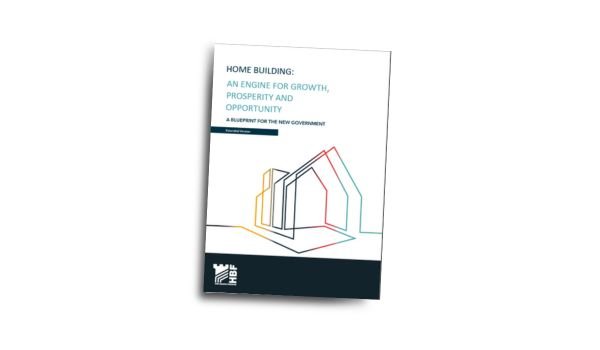Last updated: 29 Jul 2024
Home building: An engine for growth, prosperity and opportunity
Home builders are on the front line of addressing the housing crisis, driving innovation and creating vibrant new communities.
Delivering more new, energy efficient homes and sustainable neighbourhoods also helps unlock growth and prosperity for communities around the country.
However, housing costs in Britain now exceed those in major economies in Europe and the rest of the world, meaning that the inability to build the homes the country needs is having a profound impact on economic productivity and the life chances of the population.
A blueprint for a brighter future
Housing the Nation: Homes to meet the needs of the country
Housing costs are at an all-time high, but this is the first time in a generation that first-time buyers are without market support. Affordable, high quality new homes of all tenures are needed to address the housing crisis.
Increasing housing supply: Establishing a clearer policy landscape
The country is not planning for enough new homes. The planning system has consistently failed to offer the right incentives and sanctions for councils to maintain up-to-date policies that ensure housing needs are met.
Fixing the planning process: Tackling systemic issues hindering delivery
At a local level, the actual process of taking a site through the planning process has never been more costly, risky or complex. Delays and uncertainty in planning timescales and decision-making is the single biggest reason why SME house builders struggle.
Greener growth: Building blocks for high quality, green homes
New skills are required to build and service the homes of the future, and will provide a pathway to effective retrofit opportunities for existing homes. The new homes shortage and our sector’s ambitions provides opportunity for Britain to be a world leader in new green jobs and technologies.

Unblocking the housing pipeline: Finding a resolution to nutrient neutrality
The acute shortage of homes has been exacerbated by a disproportionate moratorium on new housing that have been in place in 74 local authority areas for 5 years, preventing the delivery of more than 160,000 homes.

Our asks of the next government
Housing costs are at an all-time high, but this is the first time in a generation that first-time buyers (FTBs) are without market support. But the housing market extends beyond those who aspire to home ownership. We need affordable, high quality new homes of all tenures to address the housing crisis.
We call on the next government to:
The country is not planning for enough new homes. The planning system has consistently failed to offer the right incentives and sanctions for councils to maintain up-to-date policies that ensure housing needs are met. Removing mandatory housing targets in 2023 has made things immeasurably worse.
We call on the next government to:
- Reverse the December 2023 changes to the NPPF, with a particular focus on reinstating mandatory housing targets and the Five-Year Housing Land Supply.
- Reform the Standard Method of Housing Need so that the existing housing stock of an area is used as a baseline, rather than household projections. A rate should be applied to this baseline by which all areas would be expected to grow their housing stock in line with a national ambition and be a starting point from which local assessments would be derived.
- Introduce a 10-year plan for housing to tackle the housing crisis and provide longer-term certainty for the industry.
- Review the Green Belt and identify areas of poor ecological value, including brownfield sites, to support the development of high quality, energy efficient new housing.
- Incentivise LPAs to have an up-to-date Local Plan in place by ensuring only areas with a current plan will be in receipt of infrastructure (or equivalent) funding.
- Encourage more devolution deals that confer statutory and mandatory spatial plan-making powers.
At a local level, the actual process of taking a site through the planning process has never been more costly, risky or complex.
Delays and uncertainty in planning timescales and decision-making is the single biggest reason why SME house builders struggle.
We call on the next government to:
- Reduce planning delays by putting planning services on a self-sustaining footing and ringfencing planning application fees for planning purposes.
- Take the politics out of housing by establishing a fixed national scheme of delegation (introducing a higher threshold for reserved matters submissions to be determined by committee).
- Rationalise the list of statutory consultees, seek greater involvement from them in the scoping of planning application material and ensure effective monitoring and enforcement of deadlines for their responses.
- Accelerate the implementation of National Development Management Policies to help speed up local plan making.
- Reform S106/CIL by ensuring wider use of standard template agreements as a basis for negotiation to ensure consistency across the country and mitigate delays.
- Support SME developers by introducing a presumption in favour of development on small sites, up to 25 homes, on brownfield land.
Investment in new housing is beneficial not just to the occupants of those homes, but also helps to promote innovative new technologies, green jobs and drive down carbon emissions.
The homes of the future will require new skills to build and service them and will provide a pathway to effective retrofit opportunities for existing homes. By turning the shortage of new homes and our sector’s ambitions into an opportunity, Britain can be a world leader in new green jobs and technologies.
We call on the next government to:
- Develop a roadmap for establishing the talent pipeline needed to deliver low-carbon and energy efficient new housing. This should include the training and recruitment of heat pump installers as well as measures to ensure that post-16 education provided through Further Education (FE) colleges has more focus on practical skills and new technologies.
- Publish the outcome of the Industrial Training Board review and implement its recommendations as soon as practicable.
- Reform the Apprenticeship Levy to make it simpler, nimbler and more flexible to respond to the needs of businesses.
- Produce a strategy for ensuring that infrastructure, such as the National Grid, has sufficient capacity to support the delivery of new and increasingly energy efficient new homes.
- Implement the Competition and Markets Authority’s recommendations for a single mandatory industry consumer code and the provision of access to the New Homes Ombudsman for all customers.
The acute shortage of homes has been exacerbated in recent years by a disproportionate moratorium on new housing across a quarter of the country imposed by Natural England. Occupancy of new homes makes a negligible impact on the quality of our waterways but for five years housing embargos have been in place in 74 local authority areas, preventing the delivery of more than 160,000 homes.
Meanwhile, water companies fail to invest in infrastructure despite billions of pounds of payments from developers, and farmers continue to be granted licences to spread harmful nitrates on land in Nitrate Vulnerable Zones.
We call on the next government to:
- Bring forward new legislation to enable the 160,000+ new homes currently blocked by Natural England’s nutrient neutrality mitigation measures (and other issues such as water neutrality) to be built.
- In the short term, commit to working with Natural England to review its nutrient mitigation calculator to reflect the minor contribution (<1%) that the occupancy of new homes makes toward nutrient pollution.
- Extend planning permission for sites in affected catchments that have been held up due to nutrient neutrality requirements.
- Require water companies to account for how they spend developer fees and invest in their networks to meet the future housing needs of the population.